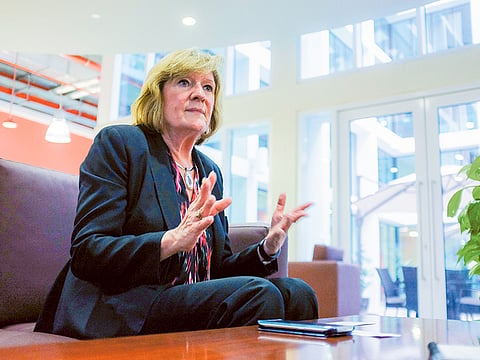Nasa to work with UAE on Mars probe, US official says
US space agency to put communications capability on Hope spacecraft reaching the Red Planet in 2021

Dubai: The National Aeronautics and Space Administration (Nasa) of the US will work with the UAE Space Agency on putting communications capability on the UAE’s Mars probe Hope, Nasa’s deputy chief scientist has said.
In an interview to Gulf News during her visit to the UAE last week, Dr Gale Allen said the development is part of a recently signed “umbrella agreement” for collaboration between the two agencies.
The UAE is the first Arab and Islamic country to undertake a mission to Mars by sending its unmanned Hope spacecraft to study Mars up-close. The probe will travel more than 60 million kilometres in its nine-month journey, coinciding with the UAE’s 50th anniversary in 2021.
The mission will be supervised by the UAE Space Agency and developed by Mohammad Bin Rashid Space Centre (MBRSC), with support from international partners.
Dr Allen, who flew in for the UN-UAE High Level Forum on Space as a Driver for Socio-Economic Sustainable Development, said, “We want to work very closely with the UAE on any other missions going forward.”
She said, “For the Mars probe, one of things that is very interesting to us is an opportunity to put communications capability on the probe. The importance for us is that we really want to send humans to Mars in the 2030s … We do not have good communications in that area. We are looking at, possibly at some point, putting better communications up there. If we could partner and leverage the UAE Mars probe, it is certainly going to be beneficial for us.”
Dr Allen pointed out that “the agreement is an umbrella agreement. It means that we want to collaborate in future space exploration missions. The Mars probe is the first step in … collaborations, but we certainly look at this as a long-term partnership”.
Communications capability is critical in any mission to Mars as its great distance from Earth (54.6 million kilometres even at its shortest point) means a signal delay of several minutes, making it impossible to control the probe in real time from Earth.
Safer space
Dr Allen also said the UAE is helping make space safer by developing an astronomical camera network to monitor debris in space, which is a growing concern because of the potential for catastrophic collisions at super speeds with manned and unmanned spacecraft.
She pointed out that International Space Station astronauts “not long ago had to evacuate the space station. They were sitting in escape vehicles because there was a piece of a satellite that was coming right at the space station. So debris in pace has become very difficult to deal with”.
Dr Allen said the network would bolster existing measures concerning debris. “The [UAE’s] camera network is going to be useful for everybody. It’s very important for the world, not just for one country or one space agency.”
Sign up for the Daily Briefing
Get the latest news and updates straight to your inbox


